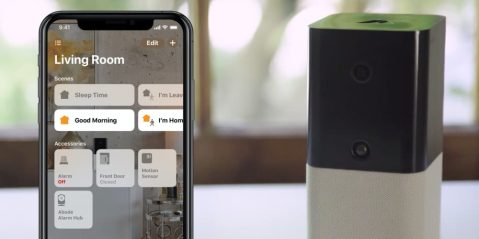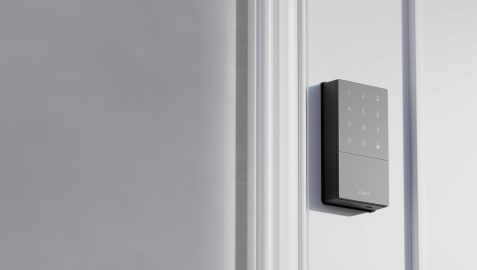
I’ve become a big fan of Reddit this year as I finally took the plunge to subscribe to a few subreddits, and one I’ve enjoyed is r/AmpliFi. A common question that is starting to be asked on the subreddit is about Wi-Fi 6e. If you aren’t familiar with Wi-Fi 6e, I suggest that you go and listen to a recent episode of Apple @ Work where I discuss it in depth with Perry Correll from Extreme Networks. Since the new technology is being considered in the open, many people are beginning to wonder if they should just skip Wi-Fi 6 and wait for Wi-Fi 6e.
About Apple @ Work: Bradley Chambers has been managing an enterprise IT network since 2009. Through his experience deploying and managing firewalls, switches, a mobile device management system, enterprise-grade Wi-Fi, 100s of Macs, and 100s of iPads, Bradley will highlight ways in which Apple IT managers deploy Apple devices, build networks to support them, train users, stories from the trenches of IT management, and ways Apple could improve its products for IT departments.
Before we can answer the question of whether you should skip Wi-Fi 6 and wait for 6e, we need to break down what each technology brings to the table in terms of benefits. With Wi-Fi 6, you’re getting a normal evolution of Wi-Fi. It builds upon Wi-Fi 5 (802.11ac) with a lot of really nice enhancements. It was the first Wi-Fi standard that began development post-mobility revolution that the iPad and iPhone ushered in for schools, retail environments, enterprise networks, healthcare, etc.
What is Wi-Fi 6?
OFDMA is a critical piece of technology in Wi-Fi 6. To achieve the additional capacity for a network, a 20 MHz channel is split into as many as nine smaller channels. Using OFDMA, a Wi-Fi 6 AP could simultaneously transmit frames to nine Wi-Fi 6 clients. Wi-Fi 6 brings back 2.4 GHz support as 802.11ac was 5 GHz only.
While I prefer to use 5 GHz band (a minimum of 19 non-overlapping channels vs. 3 for 2.4 GHz), 2.4 GHz is still being used by devices due to its low cost and battery life (particularly for IoT sensors). Another critical addition for Wi-Fi with Wi-Fi 6 is called Target Wake Time. TWT allows devices to set when and how often they will wake up to send and receive new data. TWT increases device sleep time and can substantially improve battery life for mobile devices and IoT sensors.
With Wi-Fi 6e, it’s a revolution for wireless networking. The best way I know how to explain it is to imagine if all Tesla cars had a road just for themselves. How much less traffic would you see on your commute? That is what Wi-Fi6e creates. It operates on the 6 GHz band so that no legacy devices can access it. Wi-Fi 6e devices will be able to work on Wi-Fi 6 and other previous standards, but no devices without 6e support will be able to access the superhighway. From a capacity standpoint, it’ll have access to 59 non-overlapping channels, so places like sports arenas, concert halls, and other high-density environments will provide much more capacity with less interference.
Should you wait on Wi-Fi 6e?

No one is disputing that Wi-Fi 6e will be the most significant upgrade since Wi-Fi was created, but the common question is, should you wait on that if you need a network upgrade today? The answer, in my opinion, is no. We are years away from Wi-Fi 6e being a reality for devices and networking hardware.
The FCC just approved the use of the 6 GHz band in unlicensed uses a few months ago, so the standard is just beginning development. If you pay attention to the networking industry, you know that we’ve been hearing about Wi-Fi 6 for at least four years. While networking hardware is readily available, many devices still don’t even support it. On the Apple side, only the newest iPhones and the latest iPad Pros support it. The current Apple TV doesn’t support it. The brand new MacBook Airs and MacBook Pros don’t support it. Even the high-end Mac Pro doesn’t support it. Likely, the Mac lineup won’t see Wi-Fi 6 support until Apple finishes the ARM transition. You might be thinking, well, that argument means I should wait since Apple isn’t supporting Wi-Fi 6 across its lineup yet. My point in explaining that is these transitions take years. I don’t expect readily available Wi-Fi 6e networking equipment until 2022, and we will have to wait for the client devices to roll out after that.
If you are due for an upgrade today, you should upgrade to new Wi-Fi 6 hardware (at home and the office). It’ll serve you well for years to come, and by the time it’s ready to be replaced, Wi-Fi 6e hardware and client devices will likely be ready. Technology is always evolving, and if you are waiting for the one that isn’t going to be outdated soon, then you’ll never be able to buy anything. By the time one technology reaches the stage where you can purchase it, it’s already being phased out by the standards bodies. To put it in an Apple context, if we knew what Apple was planning with its A series of chips for the next few years, you’d avoid buying anything on the market today. Wi-Fi 6e is very exciting, and I can’t wait for it, but Wi-Fi 6 is an excellent upgrade if you have a Wi-Fi 5 network that is coming off lease or ready to be replaced.
Photo by Morning Brew on Unsplash
FTC: We use income earning auto affiliate links. More.









Comments